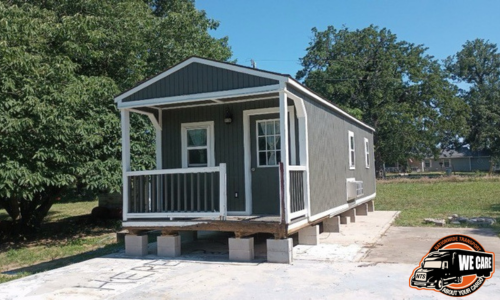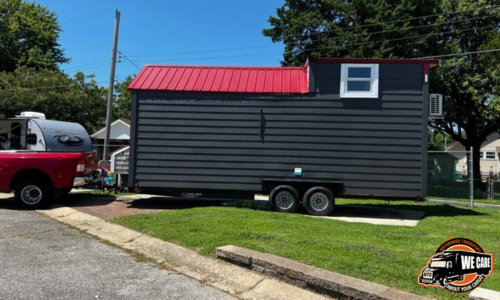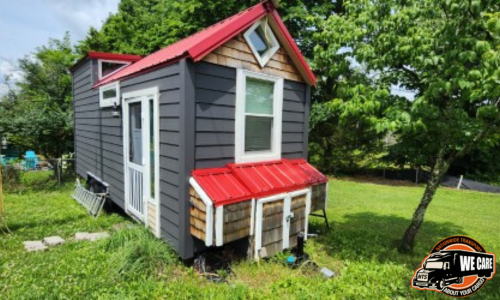Tiny Homes Shipping Company
The tiny home movement is booming nationwide as more people adopt affordable and flexible living solutions. As housing costs and the demand for affordable housing soar, many states are loosening and simplifying regulations to accommodate these innovative dwellings. Tiny homes are cheaper and offer flexibility thanks to their small size and mobility, making them an attractive option for many Americans. Nationwide Transport Services is your trusted provider for tiny home shipping across Arizona. We manage all the necessary paperwork, including permits and insurance covers. Oversize tiny homes need to comply with oversize regulations and might require pilot cars. Contact us today to have your tiny home delivered efficiently and on time. (877) 278-3135
or
TINY HOME SIZE REQUIREMENTS IN ARIZONA
Tiny homes are classified into two: On foundations (permanent houses) and on wheels (THOW). In Arizona, a tiny house is considered a residential structure with a minimum floor area of 200 square feet, a maximum of 400 square feet for permanent structures, and 160 square feet for tiny homes on wheels. Arizona allows residents to reside in permanent tiny houses full-time but must follow local zoning regulations and area-specific building codes. The tiny homes must be inspected, and a Certificate of Occupancy must be given before they can be lived in. THOWs are classified as recreational vehicles (R.V.s) and fall under different regulations. The rules do not allow permanent residence in them.
Tiny Homes on Wheels (THOW)
Tiny homes on wheels must also be at least 160 square feet. If they are licensed as travel vehicles, they are considered Recreational Vehicles (R.V.s) and trailers, and permanent residence is not allowed. They also have specific parking zones. In Arizona, tiny houses on wheels must be constructed on approved trailers and set up on approved foundation sites, like a mobile house pier-jack foundation. Tiny houses on wheels are considered mobile homes and thus must cater to the specific standards of a mobile house.
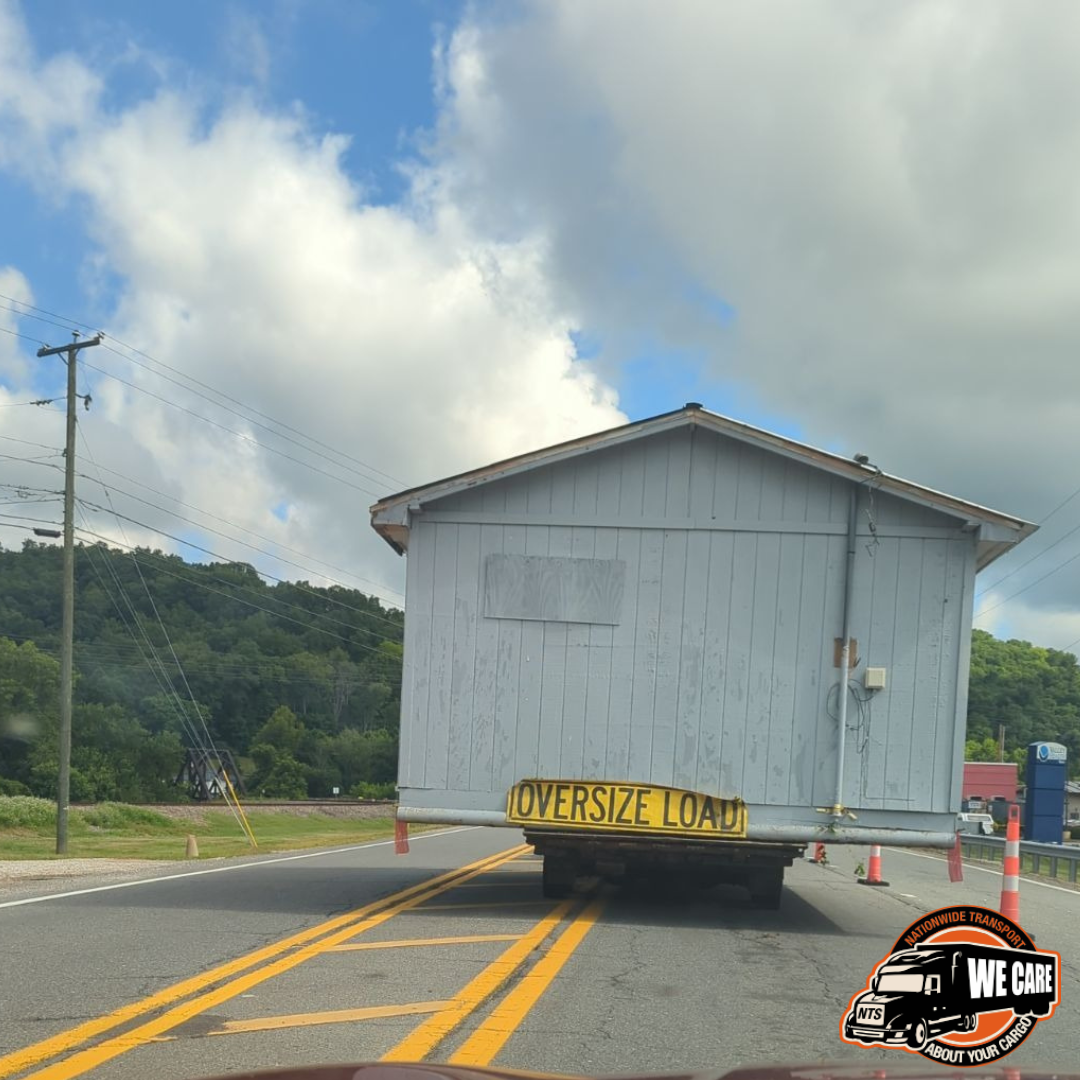
Permanent Structures
These structures must adhere to the same building codes as traditional homes, with a few tweaks. Lofts on permanent tiny houses must meet the minimum size requirement of 35 square feet of floor area. The lofts must measure at least 5 feet horizontally and have a 3-foot ceiling height. Arizona regulations define a permanent tiny house as a tiny home built onsite on a regular foundation. An onsite foundation could be solid slabs, concrete, wood, trailers, or skids. The state requires tiny houses built on foundations with a minimum ceiling height of 6'4''. They should be fitted with a minimum of 60 Amperes electrical circuit panels even though the power load determines the specifications for the electrical circuits. Tiny permanent homes must also have an emergency exit on the roof, at least one bedroom, and comply with plumbing ventilation regulations. They must also have smoke detectors for fire safety.
Transitional Structures
Tiny homes built on skids are referred to as transitional structures. Skids are oversized rails that run under a building's foundation. Tiny transitional structures fall under similar rules and regulations to tiny permanent homes. However, the law mandates that homeowners remove anything that would make them mobile, like wheels, axles, etc. Homeowners can move a transitional structure on a trailer, but it's expensive and time-consuming.
What Are the Tiny Home Regulations in Arizona?
Tiny homes are subject to various state, county, and municipal regulations to ensure residential safety and proper land use. The regulations vary by county, and understanding them is essential for those planning to build, transport, or live in a tiny home in Arizona. Complying with regulations helps ensure that your tiny home experience is hassle-free. Always consult local authorities and obtain the necessary permits to avoid legal complications. Below are some critical aspects of tiny home regulations in the state:
- Property Taxes: In Arizona, property tax laws for tiny homes depend on whether the home is built on a permanent foundation or wheels. Tiny homes on wheels are not subject to property taxes as they are considered R.V.s but may incur motor vehicle registration fees and taxes. However, if the tiny home is built on a permanent foundation on land you own, it may be assessed for real estate taxes, just like any other residential property.
- Parking Requirements: For tiny homes on wheels, parking is restricted to certain areas, including designated R.V. parks, campgrounds, or long-term parking zones. Arizona law prohibits tiny homes on wheels from being parked permanently in residential areas, such as in a backyard since they are considered recreational vehicles. You may live in your tiny home on wheels at an approved location, but you must adhere to local zoning laws. Some counties and municipalities allow temporary parking, but you may need to move the home periodically or obtain special permits for extended stays.
- Zoning Laws: Zoning laws in Arizona vary by county and city, making it essential to consult local authorities before placing a tiny home on any property. In Arizona, there are several growing tiny home communities where zoning laws are tailored to support alternative housing solutions. These communities are a perfect option for those seeking a permanent location for their tiny home.
- Building Codes: Arizona follows the International Residential Code (IRC), with specific alterations to accommodate tiny homes. Homes built on wheels, however, are generally regulated under R.V. or mobile home codes and may not need to meet the exact strict building code requirements.
- Insurance Requirements: Insurance for R.V.s is typically required for tiny homes on wheels, especially if the home has an outstanding loan or will be used for travel. Even if insurance is not mandated, it is strongly recommended for any tiny homeowner to protect against potential financial loss.
- Fire Protection Systems: Arizona's fire safety regulations mandate that tiny homes on permanent foundations comply with fire safety standards, including installing smoke detectors and carbon monoxide alarms. Additional requirements like fire extinguishers or automatic sprinkler systems might exist depending on the county. Fire safety measures are also recommended for tiny homes on wheels, although they may not be as strictly enforced as in permanent structures.
TINY HOME COMMUNITIES IN ARIZONA
Arizona has a favorable climate, and land costs are relatively affordable compared to other states. Here are some tiny home communities to consider.
- LuxTiny Community (Lakeside, AZ)
- Village on 13th (Phoenix, AZ)
- Escalante Village (Tempe, AZ)
- Tiny House Developers Community (Show Low, AZ)
- A New Beginning Tiny Homes (Prescott Valley, AZ)
WHERE CAN I BUY A TINY HOME IN ARIZONA?
If you’re considering investing in a tiny home in Arizona, here are some manufacturers to look at. Remember, we ship tiny homes from these manufacturers to all parts of the country.
- Uncharted Tiny Homes (Phoenix, AZ)
- LuxTiny (Lakeside, AZ)
- Cavco Park Models & Cabins (Phoenix, AZ)
- Phoenix Tiny Homes (Phoenix, AZ)
- Cornerstone Tiny Homes (Tucson, AZ)
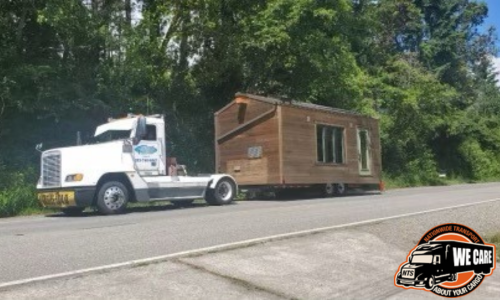
TRUSTWORTHY TINY HOME SHIPPING SERVICES IN ARIZONA
When moving a tiny home in Arizona, comply with regulations to avoid substantial fines and penalties. Oversized regulations apply to over-dimensional vehicles on public roads. We consult authorities for R.V.s to avoid driving into restricted areas. They must also be certified for public roads. Nationwide Transport Services ships all types of tiny homes locally and across state borders.
Our services are dependable and easy to customize. Reach out for a free estimate on your load.
